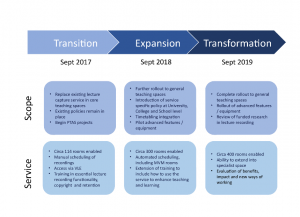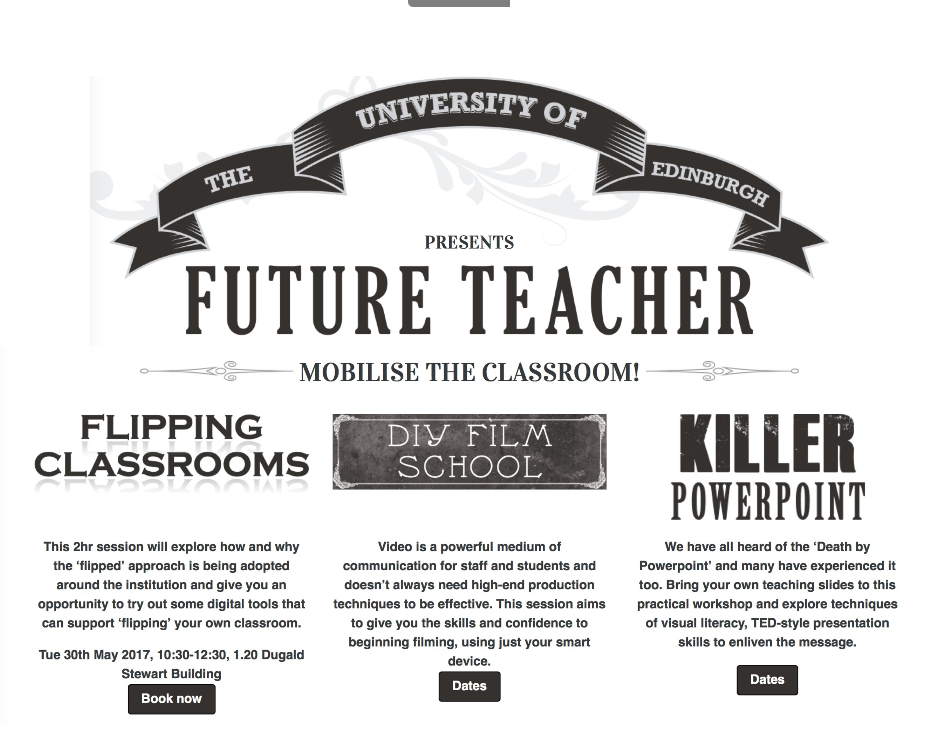On the 6th June, Echo hosted an Active Learning Conference at Kings College London which members of LEaD and Educational Research and Enterprise Systems (ERES, part of IT) attended. The aim of the event was to showcase and share good practice and to update the UK community of Echo institutions (which include UCL, QMUL, LSE and City amongst others) on the development of the new Active Learning Platform (ALP). .
There were several presentations from academics, support staff and Echo representatives throughout the day. This post summaries some of the major themes from each presenters talk. Each session was recorded and the ALP system was demonstrated throughout the day.
Contents
- Lecture Capture in the Life Sciences: Dissecting the Process
- Lecture Recording and the Wisdom of Grace Hopper
- Embedding lecture capture technologies as standard practice: a journey
- UCL Lecture Cast Journey
- Lecture Capture as an Assistive Technology at Kings College London
- Student Behaviours During Class Predict Student Success
Lecture Capture in the Life Sciences: Dissecting the Process
Firstly, we had Dr David Bryne, Director of Virtual Campus and Technology Enhanced Learning at the Faculty of Life Sciences and Medicine, d, discussing the process of Lecture Capture, the reasons for use, its deployment and use in the Life Sciences and Medicine at Kings College.
David highlighted that Generation Y or Millenials want more video (Centre for Generational Kinetics, 2016), expect things on demand, in small chunks. They watch a lot of YouTube content every month, on their mobiles first. At Kings, they currently schedule all recordings manually, but hope to automate the process from 2017 onwards. They provide staff with technical and pedagogical guidance.
Lecture Recording and the Wisdom of Grace Hopper
Following this, Anne-Marie Scott from the University of Edinburgh discussed the journey of video production at the University. With an international student body, on a large city campus and lots of learning spaces development, the university are designing technology into a new building. In class, they have trialled the catch box microphone. Video is a powerful medium of communication for staff and students and doesn’t always need high-end production techniques to be effective. She explained how they run the #DIYFilmSchool, giving students the confidence to use filming equipment to produce quick videos as part of the future teaching CPD programme

Embedding lecture capture technologies as standard practice: a journey
Leah Chandler from the University of Tasmania (UTAS) discussed how they have 90,000 captures in 88 venues for 2,300 staff and 29,000 students. Demonistrating the Poll Activity within the system to find Tasmania on the map, Leah described the journey from 2005 trial to 2011 when flipped classrooms were trialled with the system.
Great reasons from the students for using lecture capture, especially as 50% felt it stopped them from dropping out. #ALCTour17 pic.twitter.com/gAIGP2qaqr
— Julie Voce (@julievoce) 6 June 2017
Now with Active Learning Platform, UTAS can stream overflow to another classroom distance learners can attend remotely. Leah said now is the age of Active Learning, although acknowledged that not enough communication and staff development had been done (a lesson for us at City, as we develop and embed ALP into Schools).
UTAS also developed custom creston panels for ad-hoc capture including pause, resume and stop of lecture capture. At City, we have done a lot of work on our Creston Panel design, minus the ad-hoc capture.
This is an example of an AMX control panel used by @UTAS_ for manual controlling of #lecturecapture, with audio monitoring #alctour17 pic.twitter.com/UEN4DVEQpi
— Echo360 (@echo360) 6 June 2017
UCL Lecture Cast Journey
Next, Professor John Mitchell, Vice Dean Education, UCL Engineering described the Lecture Cast journey of equipment being rolled into a learning space by UCL Digital Education team’s Jason Norton in 2007 to now having plans to expand to 150 in the coming academic year. Julie Voce, Head of Educational Technology here at City, noticed similar patterns of views per month when at Imperial.
@drjohnmitchell talks about student lecture viewing patterns. We noticed the same pattern amongst students at @imperialcollege #ALCTour17 pic.twitter.com/6qzZBjQcfq
— Julie Voce (@julievoce) 6 June 2017
John discussed the interdependies and compleixities of the system behind the scences, which is often forgotten by academic staff at a higher education insitution. John also mentioned possible upcoming legal change, in the shape of the General Data Protection Regulation (GDPR) and a link to a pilot study using lecture tools at UCL (Dale et al, 2013). John concluded by stating that it was still a challenge to support staff development and to make them embrace more interactivity and look at lecture capture analytics to inform their teaching practice. A challenge many in the room shared.
Lecture Capture as an Assistive Technology at Kings College London
Jane Henderson, Senior Lecturer in Law discussed Lecture Capture as an Assistive technology with only 3 slides, making the point that students really find lecture capture useful when they have special differences and it wasn’t available even a decade ago in many universities.
The ability to listen, or listen again, for students with #SEN, #lecturecapture can be transformative – Jane Henderson #ALCTour17
— Echo360 (@echo360) 6 June 2017
Student Behaviours During Class Predict Student Success
Professor Perry Samson, Michigan University is the architect and developer of what is the Active Learning Platform, which Echo bought and intergrated it into Echo. He started with the idea that staff need to shift from what did I teach to what did my students learn, quoting a paper on undergraduate engineering teaching at Yale. Perry discussed how he approaches large group teaching of climate science – he asks them questions (so they actually see if they understand), which is what a lot of very good teachers say regardless of the technology they use. He also found that girls ask more questions when they use the Polling solution inside the ALP system and that more successful students watch more recordings
Gender bias revealed in student comfort to ask questions in class @pjsamson #ALCTour17 pic.twitter.com/0MwHsVlMSz
— John Couperthwaite (@johncoup) 6 June 2017
More successful students tend to watch more minutes of lecture captures after the class – @pjsamson #ALCTour17 pic.twitter.com/f8NLokd8hI
— Julie Voce (@julievoce) 6 June 2017
Formative assessments in class allow students to test understanding,justify answers and reflect on their learning @pjsamson #ALCTour17 #altc pic.twitter.com/byzqfCpyzr
— John Couperthwaite (@johncoup) 6 June 2017
We came back with some tips both pedaogogical and technical and also got to experience the Active Learning Platform throughout the day. If used reguarly and students are taught to take effective notes with it, ask questions and are questioned, then it can be something that moves the lecture forward, making it more relevant to the 21st Century learner.

